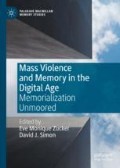Abstract
This chapter identifies several themes that emerge from the contributions to this volume. These include how memorialization, once “unmoored” from the state and physicality, permits new patterns of contestation of official narratives as well as the reclaiming of the past by non-state actors. It also considers some of the more nefarious possibilities of these developments, entertaining the idea that challenging narratives can help conflict endure. The chapter concludes with a discussion of the implications of the processes addressed in this volume for larger issues such as memory and truth, as well as possibilities for further research.
Access this chapter
Tax calculation will be finalised at checkout
Purchases are for personal use only
Notes
- 1.
For more on this, see Longman’s (2017) discussion of the Kagame regime’s efforts at narrative control (pp. 22–27).
Bibliography
Anderson, Janna, and Rainee, L. 2017. The Future of Truth and Misinformation Online. [Online] Pew Research Center: Internet, Science & Tech. Available at: https://www.pewinternet.org/2017/10/19/the-future-of-truth-and-misinformation-online/. Accessed 8 Nov 2019.
Boellstorff, Tom. 2008. Coming of Age in Second Life: An Anthropologist Explores the Virtually Human. Princeton: Princeton University Press.
Danto, Arthur C. 2005. The Philosophical Disenfranchisement of Art. New York: Columbia University Press.
Longman, Timothy. 2017. Memory and Justice in Post-Genocide Rwanda. Cambridge: Cambridge University Press.
Ritchin, Fred. 2009. After Photography. New York: W.W. Norton.
Turkle, Sherry. 2017. Alone Together: Why We Expect More from Technology and Less from Each Other. 3rd ed. New York: Basic Books.
Author information
Authors and Affiliations
Corresponding author
Editor information
Editors and Affiliations
Rights and permissions
Copyright information
© 2020 The Author(s)
About this chapter
Cite this chapter
Simon, D.J., Zucker, E.M. (2020). Conclusion. In: Zucker, E., Simon, D. (eds) Mass Violence and Memory in the Digital Age. Palgrave Macmillan Memory Studies. Palgrave Macmillan, Cham. https://doi.org/10.1007/978-3-030-39395-3_10
Download citation
DOI: https://doi.org/10.1007/978-3-030-39395-3_10
Published:
Publisher Name: Palgrave Macmillan, Cham
Print ISBN: 978-3-030-39394-6
Online ISBN: 978-3-030-39395-3
eBook Packages: Literature, Cultural and Media StudiesLiterature, Cultural and Media Studies (R0)

